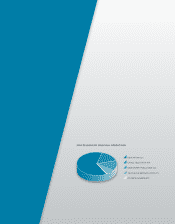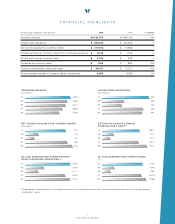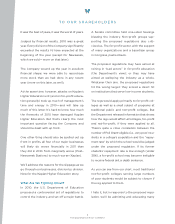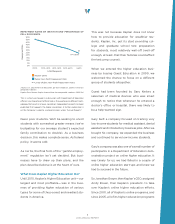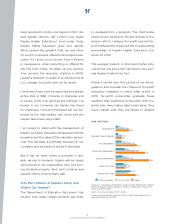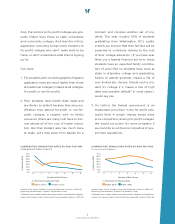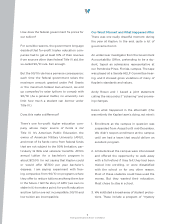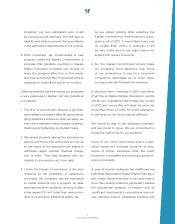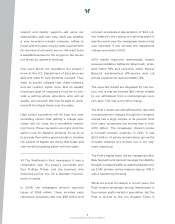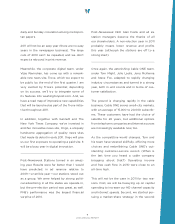Washington Post 2010 Annual Report Download - page 4
Download and view the complete annual report
Please find page 4 of the 2010 Washington Post annual report below. You can navigate through the pages in the report by either clicking on the pages listed below, or by using the keyword search tool below to find specific information within the annual report.
2
THE WASHINGTON POST COMPANY
TO OUR SHAREHOLDERS
It was the best of years, it was the worst of years.
Judged by financial results, 2010 was a great
year. Every division of the Company significantly
exceeded the results I’d have expected at the
beginning of the year (except for Newsweek,
which we sold—more on that later).
The Company wound up the year in excellent
financial shape; we were able to repurchase
more stock than we had done in any recent
year (more on this later, as well).
At the same time, however, attacks on Kaplan’s
Higher Education unit (and on for-profit educa-
tion generally) took up much of management’s
time and energy in 2010—and will take up
much of this letter. It’s hard to know how much
the fireworks of 2010 have damaged Kaplan
Higher Education. But that’s clearly the most
important question facing the Company and
should be dealt with up front.
One other thing should also be spelled out up
front: in profits, all four of our major businesses
will likely do worse financially in 2011 than
they did in 2010, from marginally worse (Post–
Newsweek Stations) to much worse (Kaplan).
We’ll address the reasons for the slippage as we
go through our businesses, division by division.
Now for the Kaplan Higher Education story.
What Are We Fighting About?
In 2010, the U.S. Department of Education
proposed a controversial set of regulations to
control the industry, and set o a major battle.
A Senate committee held one-sided hearings
blasting the industry. Non-profit groups sup-
porting the proposed regulations also criti-
cized us. The for-profit sector, with the support
of many organizations and a bipartisan group
in Congress, pushed back.
The proposed regulations may have aimed at
reining in “bad actors” in for-profit education
(the Department’s view); or they may have
aimed at walloping the industry as a whole.
Whatever their aim, the proposed regulations
hit the wrong target: they scored a direct hit
on institutions that serve low-income students.
The regs would apply primarily to for-profit col-
leges as well as a small subset of programs at
traditional public and non-profit colleges. But
the Department released information that shows
how the regs would aect all colleges, for-profit
and not-for-profit, if they were applied to all.
There’s quite a close correlation between the
number of Pell Grant-eligible (i.e., very poor) stu-
dents in a college’s population and the “repay-
ment rate” by which the school would be judged
under the proposed regulation. If its former
students’ repayment rate is low enough (under
35%), a for-profit school may become ineligible
to receive federal aid, a death sentence.
As you can see from our chart, most traditional
not-for-profit colleges serving large numbers
of poor students would be subject to closure if
the reg applied to them.
I hate it, but in response to the proposed regu-
lation, we’ll be admitting and educating many


